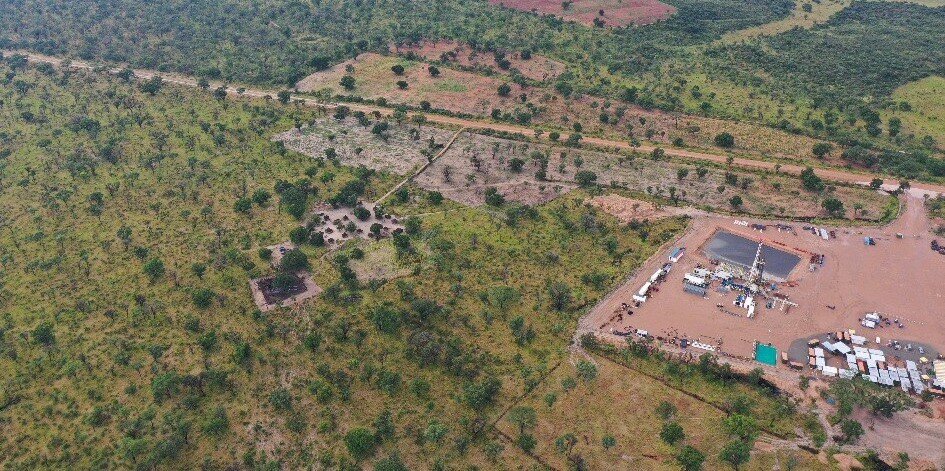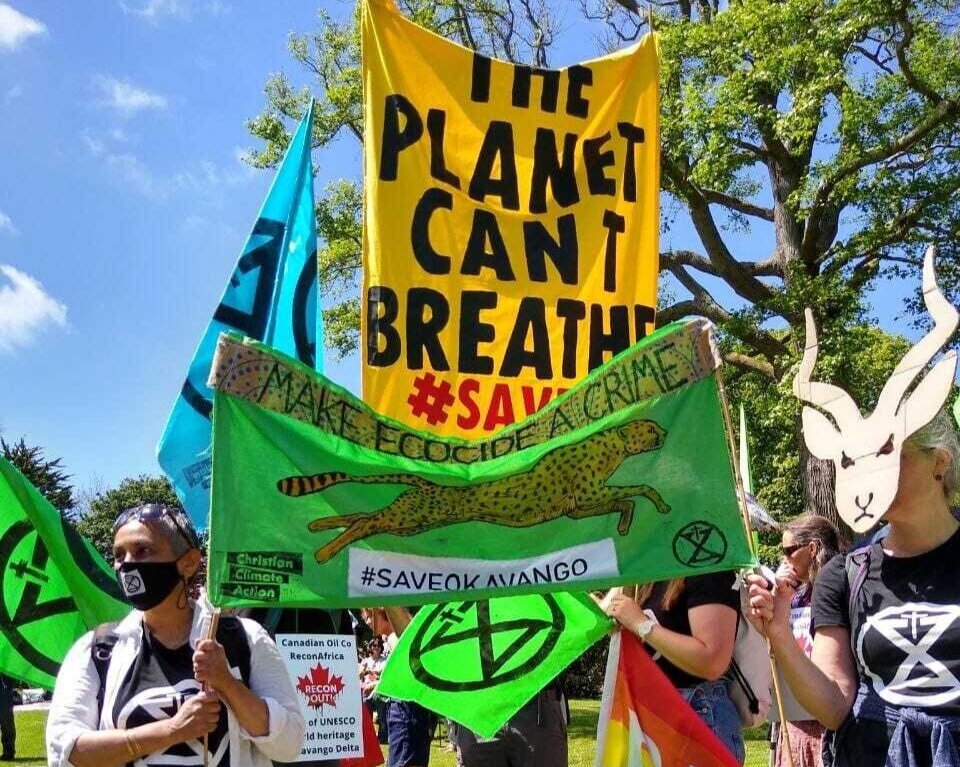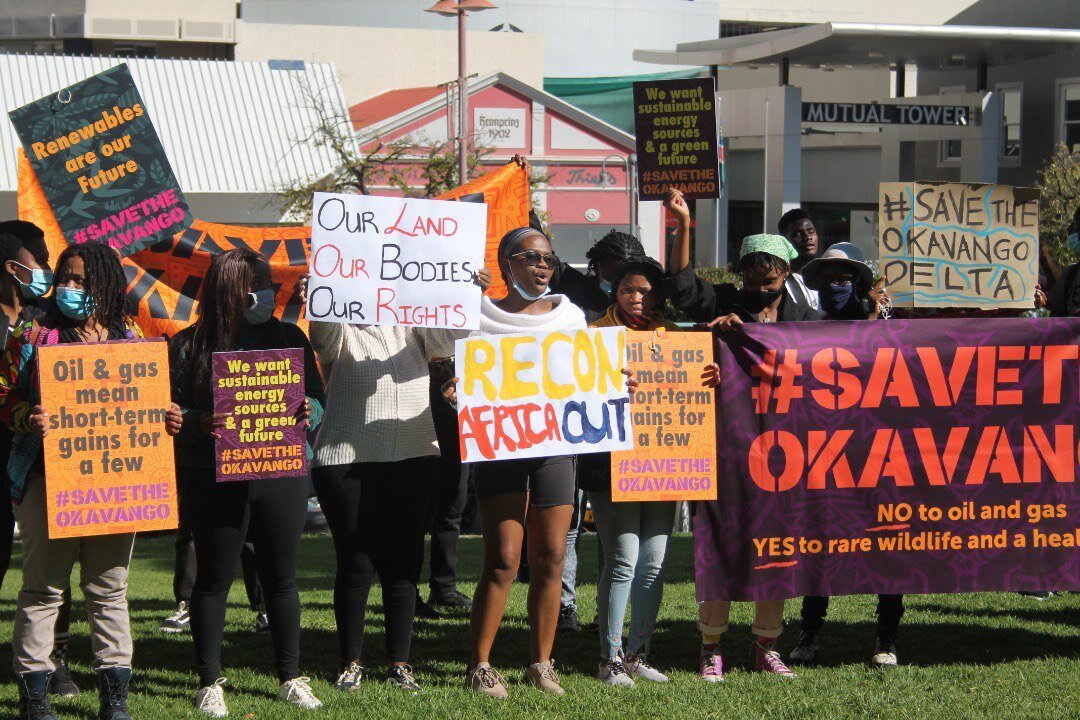ReconAfrica: ecocide in the Kavango Basin
This guest blog is part of a series intended as a dedicated space for the many global movements/campaigns around the globe confronting ecosystem destruction to share their stories, narratives and perspectives.
This in-depth blog was written by Esther Stanford-Xosei, coordinator of the Stop the Maangamizi: We Charge Genocide/Ecocide Campaign and co-founder of the Extinction Rebellion Internationalist Solidarity Network. Additional links and campaigning resources were collated by Louise Romain, international grassroots outreach for Stop Ecocide.
She writes about the ecocidal and genocidal impacts of the exploratory activities of the Canadian oil and gas company, ReconAfrica, for Indigenous and local communities. She suggests how a Pan-Afrikan Reparatory Justice can offer solutions for affected communities.
Image credits: John Grobler
An ecological disaster and a carbon bomb
ReconAfrica is a Canadian oil and gas company engaged in the exploration and development of fossil fuels in the Kavango Basin, which spans north-eastern Namibia and north-western Botswana. The company has a petroleum exploration licence for oil and gas which entitles it to obtain a 25-year production licence as well as potentially frack an estimated 120 billion barrels of oil across an area of unique, unspoilt ecosystem, larger than Belgium. This area covers 9,800 square miles of Namibia in addition to an adjacent area in neighbouring Botswana of 13,250 square miles. Worryingly, ReconAfrica holds a 100% interest in the petroleum licence in northwest Botswana and a 90% interest in the licence which operates in Namibia. The licenses area consist of six locally managed wildlife reserves, or conservancies, and is also home to various endangered species of large mammal, such as Afrikan wild dogs, lions, cheetahs, black and white rhinoceros, white-backed vultures, ground pangolins, Afrika’s largest remaining herd of Savanna elephants as well as 400 species of birds.
Namibia is recognised as one of the countries most vulnerable to the impacts of climate change, so it beggars belief that the Namibian Government would score an own goal by collaborating in ReconAfrica’s disregard of its global responsibilities to contribute to reducing carbon emissions to 1.5°C as part of the Paris Climate Change Agreement. ReconAfrica's own oil-production projections of 120 billion barrels of oil will have devastating consequences on humanity– the carbon footprint of this new oilfield could amount to a sixth of humanity’s remaining maximum potential carbon budget.*
Evidence abounds of the historically documented impacts of oil and gas exploration in environmentally sensitive ecosystems. The strategic Euro-American economic geo-political interests of governments and their corporations engaged in harmful ecocidal and genocidal extractive industries are preserved in Botswana and Namibia where mining, tourism and now oil and gas production are leading sources of income generation; most of whose commodities are extracted and exported for the benefit of foreign markets, irrespective of the harm being done to people and planet. Yet, instead of recognising the ecological debt that is owed to the Indigenous Peoples of Namibia and Botswana, and the corresponding duty to support such governments and their peoples to transition to sources of renewable energy, ReconAfrica is engaging in acts of ecosystem destruction which the Indigenous Peoples and other local communities depend on amount to genocide and ecocide. Ecocide is a possible method of genocide if it fragments or destroys vital socio-ecological and cultural relationships between humans and nature. We, in the Stop the Maangamizi; We Charge Genocide/Ecocide Campaign (SMWeCGEC), refer to this as the continuation of the ‘Maangamizi’ (Afrikan Holocaust) harm of chattel enslavement and colonialism inflicted upon all Afrikan people all over the world.
Indigenous rights violations of local communities
Image credits: Namibia Media Holdings
The regions of the Kavango East and Kavango West are home to some 200,000 people including the Kavango communities and the San; recognised as being indigenous to the Okavango Delta, whose rights to free, prior and informed consent under the UN Declaration on the Rights of Indigenous Peoples are being violated. ReconAfrica is violating those rights, coming into Namibia and Botswana without the consent of the indigenous communities. They have long ago been dispossessed of their power and are disproportionately affected by the unequal distribution, ‘ownership’ and access to land as a legacy of direct colonialism of the past but also present-day neo-colonialism. With an influx of tourism operators in the delta, Indigenous Peoples like the San, Anikhwe, Bugakhwe and other local communities were pushed out of their traditional territories to make way for wildlife management areas or concessions.
Woman from the San people, Kawe, Namibia.
Image credits: Ina Maria Shikongo
Furthermore, the Kavango is the most impoverished region of Namibia with an unemployment rate of nearly 50% in Kavango East. Afrikan impoverishment is enduring in the region; despite all of the benefits that were supposed to accrue with the Okavango Delta being identified as a World Heritage Site. Instead, it became a playground of elite tourists from the USA and Europe who pay exorbitant prices for high cost safaris and tourism lodges.
Pan-Afrikan Reparatory Justice
The SMWeCGEC (Stop the Maangamizi; We Charge Genocide/Ecocide Campaign) is a genocide and ecocide prevention, redress and reparatory justice campaigning formation which advocates for Pan-Afrikan Reparations for Global Justice and Planet Repairs i.e. the need to repair holistically our relationship with, and inseparability from, the earth, environment and the pluriverse. Beyond mere descriptions of the harm being caused by ReconAfrica, the SMEWeCGEC in partnership with Extinction Rebellion Internationalist Solidarity Network (XRISN) are offering to assist, Indigenous Afrikan communities in the region to better strengthen, with unifying Pan-Afrikan Reparatory Justice movement building and internationalist solidarity glocalisation, their own self-empowering collective resistance to the foreign transnational corporate invasion by ReconAfrica of their native territory.
We need to recognise the glocal importance of their struggle to stop further oil and petroleum explorations and the possibility of fracking in Kavango East and West as well the neighbouring Botswana. This can be done by cultivating innovative ways to expose and hold ReconAfrica to account in the ‘courtroom of public opinion’ beyond the borders of Namibia, Botswana and indeed the whole of Afrika.
Image credits: Namibia Media Holdings
One such way is for the affected communities in the Okavango Delta to develop Peoples Assemblies as an alternative form of participatory democratic self-governance and decision-making regarding land and resource-use which is necessary to repair the democratic deficit inherent in the colonial state machine that remains intact. Despite waging liberation struggle, those who took over the machinery of the colonial nation-state in Namibia as recent as 1990, and Botswana in 1966, have lacked the power to: (1) reverse the consequences of the infamous Berlin Conference of 1884-1885 which carved up Afrika and arbitrarily drew up borders that exist to this day; (2) stop the harms of neocolonialism reinforcing the Berlin Conference consensus whereby large parts of Afrika were deemed to be terra nullius’ therefore serving as legitimisation for imperial powers and their corporations to extract mineral wealth and energy resources for marketisation abroad rather than for the benefit of Afrikans; and (3) effectively repair the structural violences inherent in such state ‘Bantustans’ inherited at so-called independence.
Peoples Assemblies can set up local benches of the Ubuntukgotla Peoples International Tribunal for Global Justice; an Afrikan tribunal of peoples’ humanity interconnectedness which develops and implements ‘international law from below’ to put ReconAfrica on trial for crimes of ecocide and genocide, also being spearheaded by the SMWeCGEC. These joint processes of Peoples Assemblies and local, national and international benches of the Ubuntukgotlas will enable us, in the SMWeCGEC and XRISN, to better support communities in the Okavango Delta to, not only publicise their cause, but also attract internationalist solidarity from various other communities of resistance and other progressive forces throughout the world.
Esther Stanford-Xosei, coordinator of the Stop the Maangamizi: We Charge Genocide/Ecocide Campaign and co-founder of the Extinction Rebellion Internationalist Solidarity Network
A growing solidarity movement to Save the Okavango Delta
Across the globe, various initiatives from civil society and global institutions have raised concerns about ReconAfrica’s activities, threatening the Okavango Delta and the surrounding region from ecocide.
In June, 185 community and non-governmental organizations from around the world urged Canadian officials to investigate and take action on the massive oil and gas plans of Canadian company ReconAfrica.
Image credits: Nick Clarke
Their open letter was released ahead of the company’s Annual General Meeting, and details the threats that ReconAfrica’s potential development poses for human rights, Indigenous rights, local livelihoods, drinking water for over 1 million people, the global climate, and a critical and world-famous ecosystem. Read more here.
On June 4th, a global day of action took place in various countries, such as Germany, England, Canada, South Africa, Namibia, and Botswana. An amplification and action tool kit was developed by Fridays for Future Digital, Climate Strike Canada and Kavango Alive.
In July, the World Heritage Committee expressed “concern about the granting of oil exploration licenses in environmentally sensitive areas within the Okavango river basin (...) that could result in potential negative impact on the UNESCO property in case of spills or pollution” . Read the report of the Convention concerning the protection of the World Cultural and Natural Heritage, (p. 214-217).
Image credits: Nic Eliades
In September, the Center for International Environmental Law (CIEL), Global Law Alliance and other civil society groups submitted a request to the TSX Venture Exchange (TSX-V) to investigate potential misrepresentations in the disclosures and public communications of Recon, and the gab between representation of the project to local stakeholders and to investors. Read more here.
Most recently, the International Union for Conservation of Nature (IUCN) passed a favorable motion (motion 136) to protect the Okavango from oil and gas exploitation. While it isn’t legally binding, all adopted motions become Resolutions and Recommendations, and therefore the body of IUCN’s general policy. Campaigners are now working to make sure the motion is implemented by the Namibian and Botswana governments.







